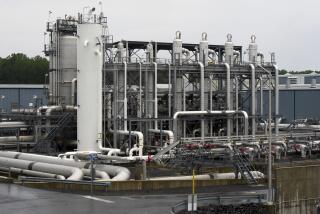In Canada, Justin Trudeau takes pipelines in a new direction
It’s getting harder to build an oil pipeline in Canada.
In 2013, when TransCanada Corp. proposed a cross-country pipeline that would be among the longest in the world, the Conservative Party was in power and the project’s approval seemed a given.
But the new Liberal government of Prime Minister Justin Trudeau is now requiring pipeline projects to pass a more stringent environmental review, including a climate test to determine how it would affect greenhouse gas emissions.
That change represents a major shift in environmental policy in Canada following nearly a decade of Conservative rule under Prime Minister Stephen Harper.
Vowing to make Canada an “energy superpower,” Harper promoted the expansion of the oil sands in his home province of Alberta and withdrew the country from the 1997 Kyoto Protocol that sought to reduce global emissions.
He advocated heavily for the 1,179-mile Keystone XL pipeline that TransCanada wanted to build from Alberta to Nebraska.
Two days after Harper left office last November and Trudeau was sworn in, President Obama denied the company’s request for a cross-border permit, saying it would have “undercut the global leadership” of the United States in combating climate change.
While Trudeau said he was “disappointed by the decision,” he also signaled that he intended to lead Canada in a new direction on environmental issues.
Less than a month after taking office, he led a large delegations to the United Nations climate change summit in Paris, where his environment minister declared that “Canada is back” and eager to negotiate a new global agreement.
Speaking at the World Economic Forum in Davos, Switzerland, this month, Trudeau said: “My predecessor wanted you to know Canada for its resources. Well I want you to know Canadians for our resourcefulness.”
Now Trudeau has turned his attention to the 2,827-mile pipeline that TransCanada had hoped to start building by 2017. Known as Energy East, it would deliver 1.1 million barrels of oil a day from Alberta and Saskatchewan, through Quebec and onto a deep-water marine terminal in New Brunswick.
The proposal has become a touchstone in the age-old battle between business and the environment.
TransCanada says the construction alone would create 14,000 full-time jobs and generate billions of dollars in tax revenue. The pipeline has the backing of politicians in Canada’s oil-rich west. Calgary Mayor Naheed Nenshi recently said it represents “energy independence for Canada.”
Montreal Mayor Denis Coderre, a former federal Liberal Cabinet minister, along with other mayors from surrounding municipalities, have expressed concerns about the environmental impact. Coderre said the pipeline would produce “too few economic benefits for Greater Montreal.”
On Tuesday, Trudeau said the previous government was more “a cheerleader” for pipeline projects than “a responsible referee.”
The next day, his government unveiled new criteria for reviewing pipeline proposals.
The measures include a climate test that will take into account not only the emissions created during construction but also those from the process of extracting oil or gas once a pipeline is built and operating. Trudeau is expected to provide more details by March on acceptable levels of emissions.
In addition, the measures call for more input from the public, including indigenous groups that have long been marginalized in such decisions.
The new rules are an interim fix to deal with pipelines already proposed while the Trudeau government works on a more comprehensive multi-year overhaul of how energy projects are approved and regulated.
Much of that overhaul will focus on the National Energy Board, a federal agency that under the previous government was handed sole authority to review pipeline proposals at the exclusion of the Environmental Assessment Agency.
The energy board does not hold open town-hall meetings. To attend hearing, members of the public must apply and demonstrate that they will either be directly affected by any decision or have “relevant” information or expertise.
Environmentalists have attacked the board for what they say is a coziness with the energy industry and an “anti-science” approach to reviewing projects.
This week, the ministry of Environment and Sustainable Development released a highly critical report that found the energy board failed to track whether pipeline companies were complying with conditions set when projects were approved.
A spokesman for TransCanada said the company still believed that it could win approval and meet its target date of 2020 for the oil to begin flowing.
The new measures will also affect a proposal by Kinder Morgan Canada Inc. to build a second pipeline alongside an existing line running 715 miles between Alberta and British Columbia. Known as the Trans Mountain expansion, it would triple the daily shipping capacity from 300,000 barrels to 890,000 barrels.
British Columbia’s Liberal government opposes the project and claims the company has not met certain conditions, such as how it would respond to or prevent an oil spill.
Dirk Lever, head of the energy research group at AltaCorp Capital Inc., a financial advisory firm in Calgary, said he believes the Trudeau government’s new pipeline assessment measures are “an attempt at a power gab.”
See more of our top stories on Facebook >>
“The feds are desperately trying to take control over resources from the provinces,” he said.
He worried that stricter rules would hurt Canada’s competitiveness in the world oil market.
“The federal government is also indirectly imposing strict environmental standards on Canadian oil production that crude oil imported from such other countries, as Saudi Arabia, does not face,” he said.
Guly is a special correspondent.
ALSO
Kerber upsets Serena Williams to win Australian Open title
ESL teacher may have played a ‘significant role’ in helping 3 O.C. inmates escape
Waiting for rain? Here’s what’s keeping the brunt of El Niño away
More to Read
Sign up for Essential California
The most important California stories and recommendations in your inbox every morning.
You may occasionally receive promotional content from the Los Angeles Times.









